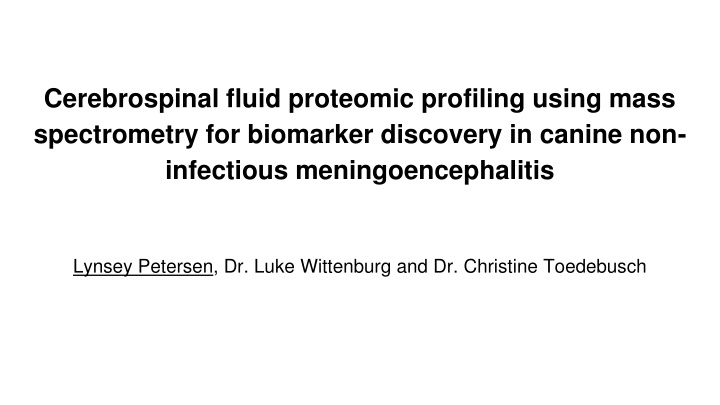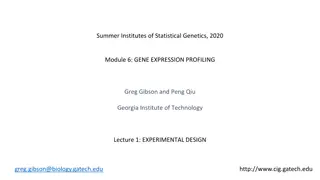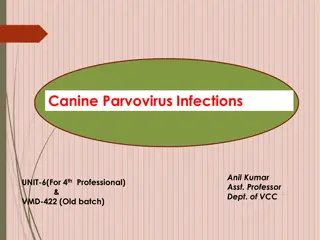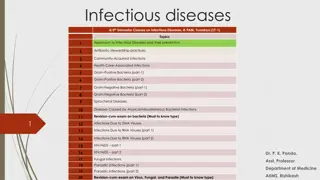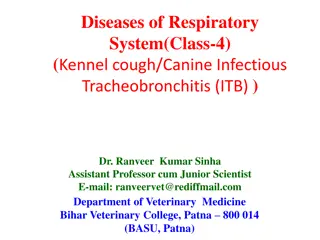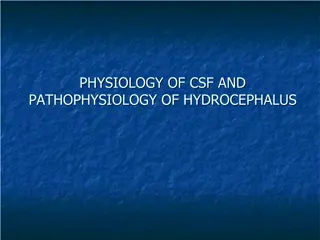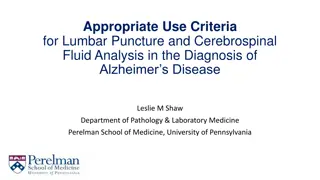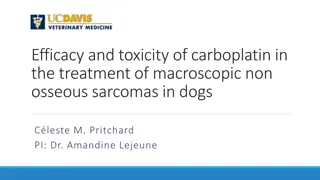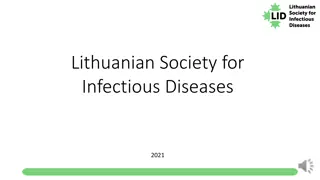Canine CSF Proteomic Profiling for Non-Infectious Meningoencephalitis Biomarker Discovery
This study focuses on using mass spectrometry to analyze cerebrospinal fluid (CSF) proteomics in dogs with non-infectious meningoencephalitis, aiming to identify unique peptide signatures for improved diagnosis and monitoring. The research addresses the diagnostic and therapeutic limitations of this condition, highlighting the potential for identifying biomarkers through CSF analysis. Specific aims include determining distinct peptide signatures in the CSF of affected dogs and aligning peptides to the canine proteome for protein identification. Results indicate the presence of 92 differentially expressed proteins in non-infectious meningoencephalitis cases compared to normal samples, emphasizing the potential for biomarker discovery and therapeutic advancements.
Download Presentation

Please find below an Image/Link to download the presentation.
The content on the website is provided AS IS for your information and personal use only. It may not be sold, licensed, or shared on other websites without obtaining consent from the author.If you encounter any issues during the download, it is possible that the publisher has removed the file from their server.
You are allowed to download the files provided on this website for personal or commercial use, subject to the condition that they are used lawfully. All files are the property of their respective owners.
The content on the website is provided AS IS for your information and personal use only. It may not be sold, licensed, or shared on other websites without obtaining consent from the author.
E N D
Presentation Transcript
Cerebrospinal fluid proteomic profiling using mass spectrometry for biomarker discovery in canine non- infectious meningoencephalitis Lynsey Petersen, Dr. Luke Wittenburg and Dr. Christine Toedebusch
Diagnostic and therapeutic shortcomings of canine non-infectious meningoencephalitis Canine non-infectious meningoencephalitis 25% of all CNS disease in dogs Presumably immune-mediated Histological subtypes Diagnosis only by histopathology No gold standard of treatment Critical need for diagnostic and therapeutic biomarker!
Rationale for our hypothesis Proteomics mass spectrometry Identification of peptides by mass:charge ratio Has revealed thousands of potential biomarkers in human medicine Cerebrospinal fluid (CSF) is the window to the brain Hypothesis CSF proteomic profiling using mass spectrometry will reveal a unique, readily detectable peptide signature that will aid in ante- mortem disease diagnosis and therapeutic monitoring of canine non-infectious menginencephalitits
Specific aims we will use to test our hypothesis Specific Aim 1: Determine whether there is a unique peptide signature in the CSF of dogs with non-infectious meningoencephalitis Specific Aim 1A: Determine the CSF peptide signature of dogs with non- infectious meningoencephalitis relative to healthy controls using unbiased tandem mass spectrometry
Centrifuge samples and remove cellular materials First steps to biomarker discovery... Cleave proteins into peptides Archived CSF samples from histopathologically confirmed cases: Normal (n=6) GME (n=6 NME (n=6 Label samples with tandem mass tags (TMTs) Submit samples for mass spectrometry Peptides aligned to canine proteome for protein ID
There are 92 differentially expressed proteins (DEPs) common in GME & NME relative to normal 748 proteins 92 DEPs
There are 32 differentially expressed proteins common in GME & NME relative to oligodendroglioma 748 proteins 32 DEPs
There are 21 DEPs upregulated in both GME & NME relative to normal and oligodendroglioma 21 biomarker candidates! 21 biomarker candidates!
Top biomarker candidates Acid sphingomyelinase-like phosphodiesterase Chitinase-3-like protein A B
Next step towards biomarker discovery... Top biomarker candidates: Acid sphingomyelinase-like phosphodiesterase Chitinase-3-like protein Specific Aim 1B: Validation of biomarker candidates in original and new CSF samples via ELISA Normal (n=4) GME (n=4) NME (n=4) Infectious meningoencephalitis (n=4) Idiopathic epilepsy (n=4)
Summary Reference library of the canine CSF proteome 21 DEPs upregulated in both GME & NME relative to normal and oligodendroglioma Acid sphingomyelinase-like phosphodiesterase and chitinase-3-like protein are top biomarker candidates for canine non-infectious meningoencephalitis
Conclusion Canine CSF proteomic profiling using mass spectrometry is a viable biomarker discovery platform! Rationale for: Biomarker validation using larger cohorts Prospective studies to determine diagnostic utility
Acknowledgements Student funding support Students Training in Advanced Research (STAR) Program NIH T35 Training Grant 5T35OD010956-22 Toedebusch Laboratory Christine Toedebusch, DVM, PhD, DACVIM Ryan G. Toedebusch, PhD Blaire Consales, VMIII Eshetu Debebe, CURE Scholar Research Grant Center for Companion Animal Health (2020-6-G) NIH 5-K01 OD026526-03 Wittenburg Laboratory Luke Wittenburg, DVM, PhD, DACVCP
Protein name Protein function Fold change (GME:normal) Fold change (NME:normal) Nucleotide phosphodiesterase activity 8.0 (p=2.0e-8) 6.5 (p-4.6e-7) Acid sphingomyelinase-like phosphodiesterase Carbohydrate binding 3.7 (p=4.0e-6) 2.0 (p=0.01) Chitinase 3-like protein
